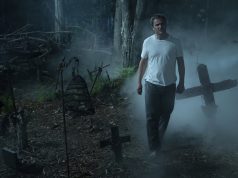There isn’t a lot for “The Crazies” to do that hasn’t already been done, and not just because it’s a remake. (The 1973 original was written and directed by zombie godfather George A. Romero.) As set-ups go, “a small town is hit by a virus that makes people homicidal” is only slightly less common than “a guy walks into a bar.” It’s what comes next that makes or breaks it, and “The Crazies,” directed by Breck Eisner (“Sahara”), mostly makes it.
The doomed town is Ogden Marsh, a Midwestern hamlet with a population of 1,260. Everyone knows everyone else, which is why it’s such a surprise when a local man walks onto the baseball field in the middle of a game carrying a loaded shotgun, a disquieting look in his eyes. The sheriff, David Dutten (Timothy Olyphant), handles the situation professionally, but the outcome is tragic. He did what he had to. The question is, why was the guy acting so loony?
David barely has time to ponder this question, though, before other residents’ behavior becomes erratic and dangerous too. I like the comparative restraint with which Eisner presents the infected people. Instead of foamy-mouthed ranters or flesh-tearing quasi-zombies, they’re just a little … off. Placid and calm, slightly catatonic, not too far from normal behavior, right up until they soak a house with gasoline and set it on fire. In this setting, that’s a lot creepier than a bunch of raving monsters. Makes it harder to know who’s infected and who isn’t.
Ah, yes, there’s an infection, or a contagion, or a virus, or whatever. Never mind what it is or where it came from. All you need to know is that Ogden Marsh comes under quarantine to prevent it spreading to other towns, leaving those who haven’t yet gone loony — David, his doctor wife, Judy (Radha Mitchell), his deputy, Russell (Joe Anderson), Judy’s teenage receptionist, Becca (Danielle Panabaker) — to escape before the crazies, the military, or the virus gets them.
The film is tense, exciting, and occasionally very scary — perhaps surprisingly so, given that it’s a remake and doesn’t have a particularly imaginative premise to begin with. Eisner lets the blood flow as needed without seeming to wallow or delight in it, and he executes two particularly memorable set pieces, one involving a car wash and the other a kitchen knife. (All I could jot in my notes was: “kitchen knife — yikes.”) There is suspense when it’s called for, comic relief at the right moments, and not a whiff of heavy-handed social or political commentary. Is the virus a metaphor for something? Don’t know, don’t care. The movie doesn’t either.
As is often the case with these things, the film’s middle section sags a bit, in that lull between the central action and the climax, which is anti-climactic anyway. (The screenplay is by Ray Wright and Scott Kosar, who between them had credits in “Pulse” and the “Amityville Horror” and “Texas Chainsaw Massacre” remakes.) But the cast runs through its paces with gusto, especially Olyphant, channeling his no-nonsense, decent-at-heart “Deadwood” lawman as he defends his town from evil. And I can overlook a saggy midsection when everything else is so solidly thrilling, so competently and unpretentiously made.
B (1 hr., 41 min.; )





